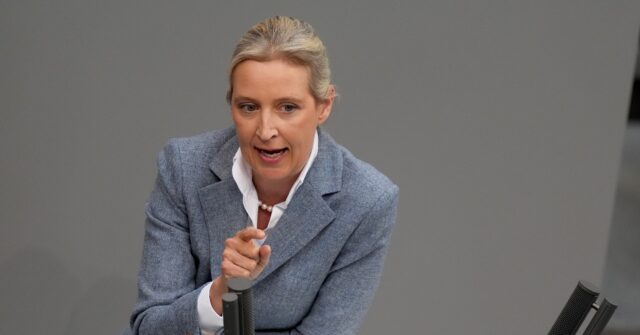Alternative for Germany leader Alice Weidel has accused the supposedly conservative Christian Democrats of abandoning their promises of clamping down on migration following the election.
Ahead of last month’s federal elections in Germany, Christian Democratic Union (CDU) leader Friedrich Merz attempted to shed the party’s association with open borders under ex-Chancellor Angela Merkel and cast himself as an immigration hardliner who would finally stem the tide of the mass influx of foreigners into the country over the past decade.
However, having boxed himself into working with the pro-mass migration, election-losing Social Democrats (SPD) after ruling out a coalition with the right-wing AfD, Merz has been forced to cede ground to the left on a myriad of issues in negotiations to form the next government in Berlin.
This comes despite Merz and the CDU symbolically breaking the so-called “cordon sanitaire” firewall around working with the AfD in any regard by joining hands with the anti-mass migration party in January to pass a ‘five point plan’ calling for increased efforts to prevent illegal immigration, step up deportations, and other migration controls in the wake of multiple terror attacks in Germany by alleged asylum seekers.
Yet, the tough stance apparently only lasted until the election, with Merz already conceding ground to the leftist SPD on key areas, including on border controls, and to commit to keeping in place reforms from the previous Social Democrat-run government, such as continuing to allow dual citizenship for non-EU migrants and the reduction in time required to obtain citizenship.
On Wednesday, AfD co-leader Alice Weidel remarked: “According to the current status of coalition negotiations, there will be no changes to migration and naturalization policy. Turbo naturalization will continue, and borders will remain open. Nothing remains of Merz’s five-point plan.”
In addition to caving on migration, the likely incoming chancellor also quickly reversed on government spending after winning the election. Despite running as a fiscal conservative and vowing to uphold the “debt brake” constitutional limit on government borrowing, Merz ushered through a bill this month to pave the way for a trillion euro spending package.
This was done during an emergency session of the outgoing parliament to avoid the AfD from being able to block the legislation with its newly won seats in the Bundestag.
While Merz justified lifting the debt brake to allow for badly needed investments in the German armed forces, he had to concede hundreds of billions in additional spending on infrastructure and climate initiatives to secure the votes of the SPD and the Greens.
The AfD, which opposed the bill, argued that it would impoverish future generations of Germans and could threaten the stability of the euro and financial markets across Europe.
The flip-flopping from Merz has done no favours for his standing with the German public. Even with his government yet to be formed, the likely chancellor has seen support for his party steadily decline since last month’s elections. According to the most recent survey from RTL and NTV, Merz’s Union fell another point over the past week to 26 per cent, down from the 28.5 per cent won at the February elections.
Conversely, the Alternative for Germany has seen its support steadily rise since the vote, climbing to an all-time high recorded by the pollsters at 23 per cent.
Follow Kurt Zindulka on X: Follow @KurtZindulka or e-mail to: [email protected]
Read the full article here
